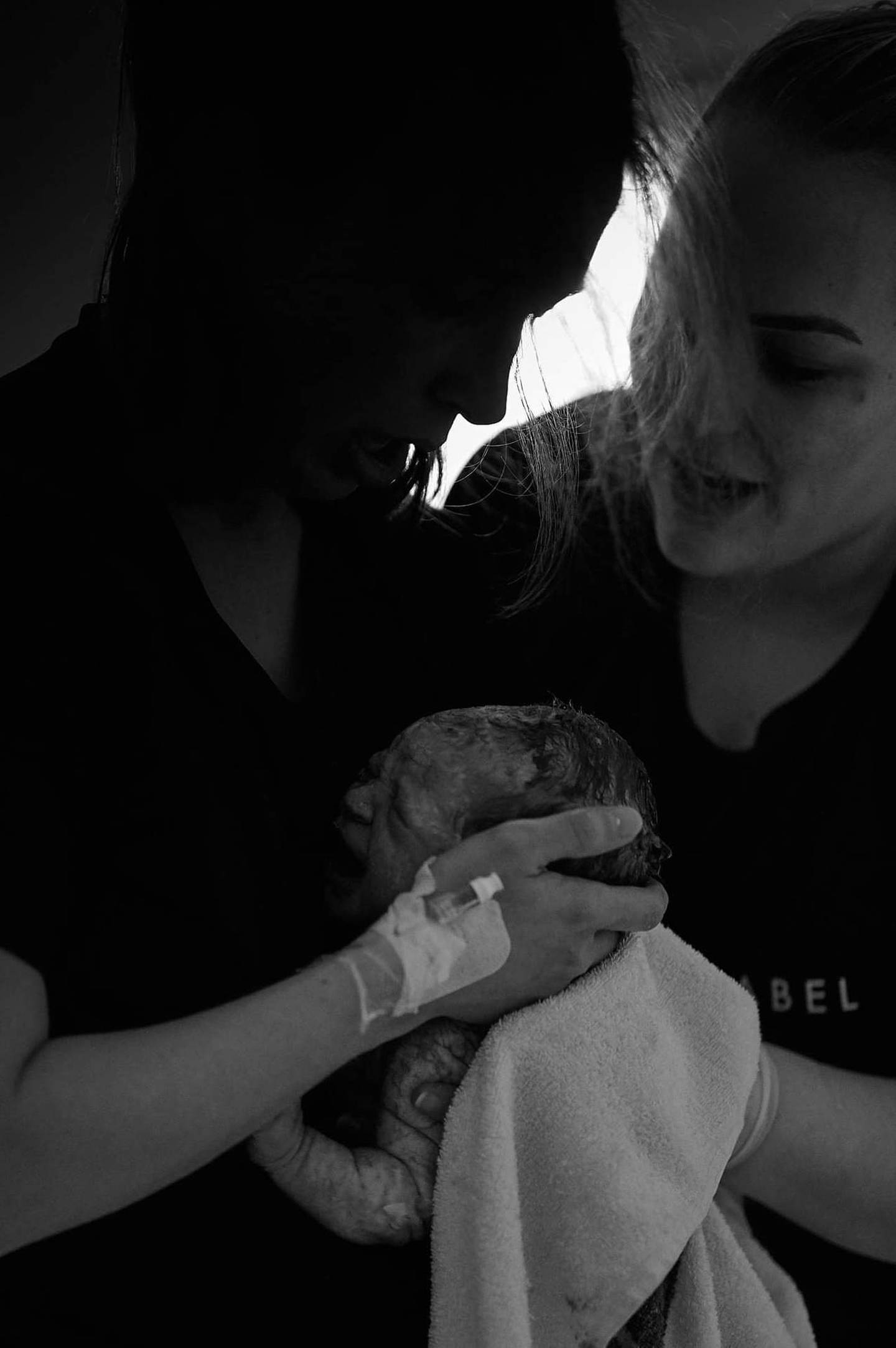
Hawkey has been driven by a passion to help women adjust to motherhood since she was about 10 years old. Now 30, she's a mum herself to 2-year-old Chloe, and on call for other mums and their babies 24/7.
But the maternity sector in New Zealand is facing a staffing crisis, mounting mental health issues amid both mums and midwives, and a lack of pay equity - and Hawkey says there are countless misconceptions about the job. One thing is clear: it's time for change.
Fighting for a fair wage
Poor pay is the main reason countless midwives are leaving the profession, despite Government promises to "fix" the maternal health sector.
"It's mind-boggling that we are still having to fight so much to be paid a fair wage," says Hawkey, who has been working as a midwife for seven years.
"The pay does not represent being on call 24/7, it doesn't represent the responsibility of providing sole care for 40 to 60 women and their babies throughout the year."
As contractors to the Ministry of Health, self-employed midwives pay all of their own expenses: clinic rent, fuel, phone bills, equipment, ACC cover, insurance, accountancy fees - and that's before deducting income tax for a job which requires them to be on call 24/7 throughout the year. They're not entitled to holiday pay, long service leave, sick leave or bereavement leave. Then there's the endless paperwork and admin for referrals and tests.
They get paid per "module" or stage of pregnancy, and the pay varies under certain conditions, although the amount of pay for attending the birth is the same whether it's a two-hour long labour or 24.
What they are left with is often less than minimum wage. And it's not enough for the "huge responsibility" of caring for mums and their babies at the same time, Hawkey says.
"We're made to feel guilty for taking time off at Christmas. There's no offer of holiday pay ... the way to fix midwifery in New Zealand is to pay us more."

Hawkey formerly worked as a staff midwife for a DHB. But when she gave birth to her own daughter Chloe in 2018, she realised shift work was no longer a viable option.
"Hospital midwives are paid appallingly, and they're working multiple, long shifts a week. It just wasn't an option to be away from my daughter for multiple, regular, 12-hour shifts each week. I would have been gone from 6am and not home until at least 8pm most nights. It's not uncommon to work up to 14-hour shifts at the hospital because most of them are so understaffed and you can't leave if there's an emergency."
As soon as midwives are registered, they are responsible for diagnosing, treating, and prescribing, Hawkey points out.
"We are often compared to nurses, who are also really underpaid and undervalued, but in general, they don't have those same responsibilities. So, when people try to compare midwives to nurses, they're really comparing apples with oranges."
Self-employed midwives care for women from when they are four or five weeks pregnant until four to six weeks after they give birth. And Hawkey reveals the demand on these midwives is "enormous".
"I'm booked until the end of March 2022," says the mum of one.
"Most women book with me before they are five to six weeks pregnant. I'm caring for women from the moment they book me until over a month after their babies are born. When they go into labour, they call us, and we provide labour and birth care and then hand over into postnatal care. We also visit them at home afterwards and help care for them."
When the baby is finally born, a midwife's work is far from over. Countless Kiwi mums don't have family around to help them adjust to new motherhood or take the reins so they can get some rest – this responsibility often falls to the midwives who visit them in the weeks after birth.
"I often find myself sitting at my women's houses for hours looking after their babies just so they can get some sleep and have a break. How else can I help them?" Hawkey asks.
"If they don't have anyone else, then we are filling that space. I want what's best for them and I want to preserve their mental health, but at the same time, it is a lot, and something's got to give."
That something is often time with her own daughter, she says - something that can't be replaced.
Midwives and mental health
It's becoming more and more common for midwives to struggle with their mental health as the demands of the job take their toll.
"The rate of burnout is really high," Hawkey says. "If you try to take a weekend off and then your practice partner has three people going into labour all at once, there goes that time off. And these are women you've known for a year - it's impossible not to put their needs over yours.
"If a woman rings me up and says, 'My baby's not moving', I need to provide that primary assessment. I could take a woman to hospital 10 times during her pregnancy and stay with her for hours and that's completely unpaid."
She admits that sometimes the mothers themselves don't realise this, creating the expectation on midwives to provide unpaid care. "It's deemed really selfish of you if you aren't prepared to do that. Most women are so understanding, but sometimes you feel really undervalued by society."
Midwives also regularly deal with the mental health concerns of their patients, which Hawkey says is really "challenging".
"Unless their mental health has deteriorated so much that they're suicidal, the availability of immediate care is just not there for them."
Hawkey and countless others like her stay in the job because despite the pay and conditions, they care about mothers and their babies.
"These women are beautiful and appreciative humans. It's so obvious how much of a difference you can make," the midwife says.
"It's amazing being able to help new mums start parenthood and it is really rewarding - it's also so important to provide care for them in those first six weeks of parenthood."
Hawkey, who was in the UK during her own pregnancy, says we're lucky to have self-employed midwives here in New Zealand - but drastic change is needed to keep them here.
"And what would New Zealand do without midwives?"
Where to get help:
• 0800 543 354 (0800 LIFELINE) or free text 4357 (HELP) (available 24/7)
• https://www.lifeline.org.nz/services/suicide-crisis-helpline
• YOUTHLINE: 0800 376 633
• NEED TO TALK? Free call or text 1737 (available 24/7)
• KIDSLINE: 0800 543 754 (available 24/7)
• WHATSUP: 0800 942 8787 (1pm to 11pm)
• DEPRESSION HELPLINE: 0800 111 757 or TEXT 4202
• NATIONAL ANXIETY 24 HR HELPLINE: 0800 269 4389













